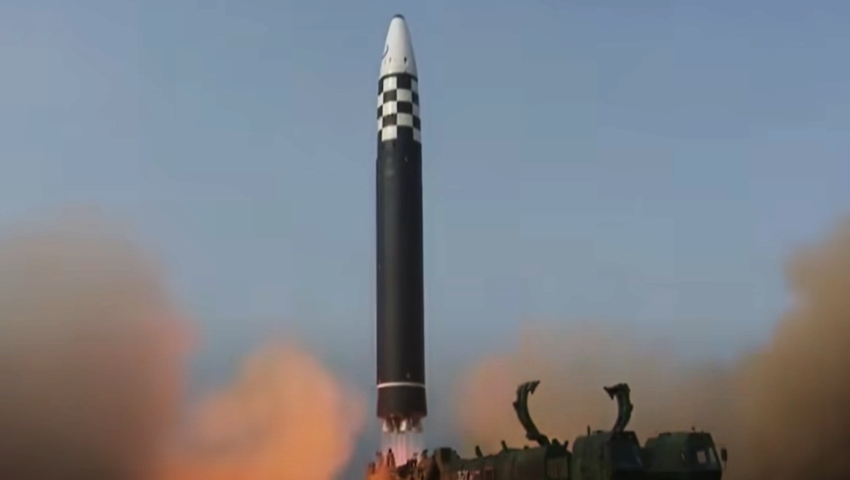How can the United States and its allies bypass China and Russia’s veto power in the UN Security Council to ensure North Korea is held to account for its violations of international sanctions?
To continue reading the rest of this article, please log in.
Create free account to get unlimited news articles and more!
Late last month, the Democratic People’s Republic of Korea (DPRK) test fired three missiles, including one intercontinental ballistic missile (ICBM) just days after a Quad leaders’ meeting between US President Joe Biden, Indian Prime Minister Narendra Modi, Japanese Prime Minister Fumio Kishida, and Australian Prime Minister Anthony Albanese.
The three tests came in quick succession, with the first and second tests spaced 37 minutes apart, and a five-minute interval preceding the third test.
This was the second time Pyongyang fired an ICBM in 2022 in violation of UN sanctions, recently reaffirmed by the Security Council in resolution 2397 (2017).
The tests were strongly condemned by the international community, with the G7 issuing a formal statement.
“We are very concerned by the unprecedented series of ballistic missile tests with increasingly versatile systems across all ranges, building on ballistic missile tests conducted in 2021,” the G7 noted.
“Together with the evidence of ongoing nuclear activities, these acts underscore the DPRK’s determination to advance and diversify its nuclear capabilities.”
US ambassador to the UN Linda Thomas-Greenfield also proposed additional sanctions, however, permanent Security Council members China and Russia vetoed the move.
“We deeply regret that the Security Council has failed to adopt the draft resolution aimed at condemning the series of recent ballistic missile launches by the DPRK and strengthening measures against it despite support from 13 members,” the G7 added.
“We urge all UN Member States, especially Security Council members, to join us in condemning the DPRK's behaviour and reaffirm its obligation to abandon its weapons of mass destruction and ballistic missile programs.
“These acts demand a united response by the international community, including a united stance and further significant measures by the UN Security Council.”
According to Bruce Klingner, senior research fellow, northeast Asia at the Heritage Foundation, it’s time for the United States and its allies to explore options to bypass Chinese and Russian obstruction to enforce additional sanctions on the DPRK.
“China and Russia have long been enablers of North Korean misbehaviour,” he writes.
“They acted as Pyongyang’s lawyer in the UN Security Council by vetoing or watering down proposed resolution texts, resisting stronger sanctions, and denying evidence of North Korea violations, blocking North Korean entities from being put on the sanctions list.
“Both countries only lackadaisically enforced sanctions for a limited time after a new UN resolution was approved.”
While “grudgingly” supporting UN sanctions on North Korea in the past, Klingner expects Beijing and Moscow to be increasingly hostile to sanctions, given the deteriorating geopolitical environment, exacerbated by Russia’s invasion of Ukraine and China’s continued aggression in the Indo-Pacific.
This hostility to sanctions, he adds, would “embolden” North Korean leader Kim Jong-un to “further belligerence”.
Klingner continues: “To date, North Korea has launched all of its ICBMs on a highly lofted trajectory so that they would not fly over Japan.
“The regime could instead choose to be even more provocative, by launching missiles over Japan, bracketing Guam with intermediate-range missiles (as it threatened to do in 2017), or demonstrating the ability of an ICBM re-entry vehicle to re-enter the earth’s atmosphere successfully after a lengthy flight.”
As such, Klingner argues the US should begin by more boldly leveraging mechanisms within its control.
“While additional UN resolutions and further tightening of sanctions are the proper courses of action, existing UN resolutions and US laws provide ample authority for increasing pressure on North Korea, China, and other violators,” he writes.
Klingner claims the US has “repeatedly pulled its punches”, treating the enforcement of US laws as a “diplomatic tool to be bargained away or held in abeyance”.
“Over the years, Washington reversed US Treasury Department sanctions on North Korean and Chinese entities, took no action against 12 Chinese banks that Congress assessed were committing money laundering crimes in the US financial system, and even publicly announced it would refrain from punishing 300 North Korean entities violating US laws,” he adds.
“The US has sanctioned more Venezuelan and Syrian entities than those of North Korea.”
Klingner calls on Washington to lead an international effort to enforce sanctions and ensure “sufficient defences” against the regime's missile and nuclear threats.
He suggests the Biden administration engage with new South Korea President Yoon Suk-yeol, who has committed to adopting a stronger stance on North Korea compared with his predecessor, Moon Jae-in.
“Yoon can be expected to support sanctions enforcement more strongly, condition any benefits to North Korea on progress toward denuclearisation, and place greater emphasis on strengthening the alliance with the US,” Klingner writes.
Finally, Klingner urges Washington to follow through with sanctions on Chinese entities enabling the North Korean regime.
“Washington should move against all entities for which it has evidence of malfeasance,” he writes.
“The US could impose billion-dollar fines on Chinese banks, as it did against European banks for money laundering for Iran, declare them as primary money laundering concerns, and freeze assets.”
Get involved with the discussion and let us know your thoughts on Australia’s future role and position in the Indo-Pacific region and what you would like to see from Australia's political leaders in terms of partisan and bipartisan agenda setting in the comments section below, or get in touch with

 Login
Login







